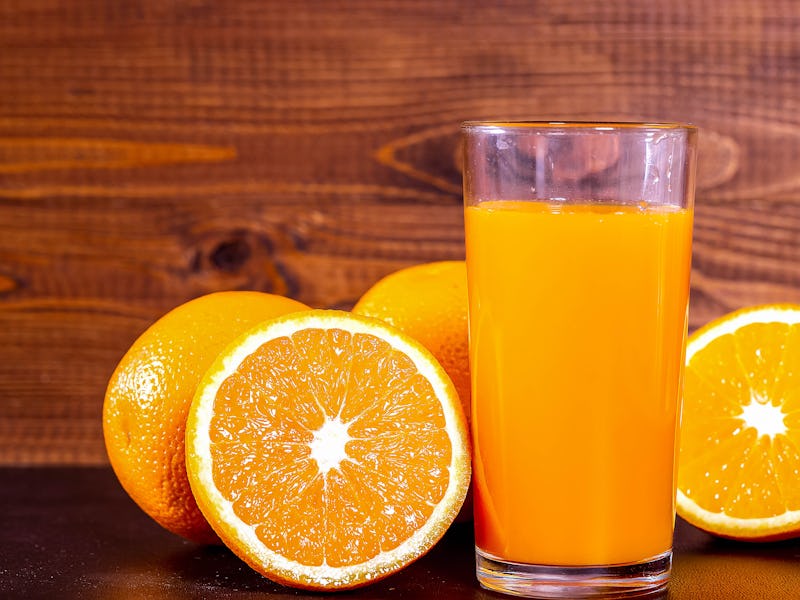Comparisons to Soda Reveal Unexpected Consequences of Drinking Fruit Juice
"Fruit juices are still widely perceived as a healthier option."

For anyone who thinks substituting a tall glass of Coke with a fresh-squeezed orange juice at the diner is a healthy choice, scientists have bad news for you. When it comes to long-term health, there may not be much of a difference between the two. Research published Friday in JAMA Network Open suggests that the sugar content in both soda and juice can contribute to shortened lifespans.
The paper shows evidence that drinking sugary beverages — soda, juice, or otherwise — is associated with an increased risk of death, or “all-cause mortality.” The researchers from Emory University, the University of Alabama, and Cornell University concluded that every additional 12-ounce sugary beverage people drank on a daily basis increased their risk of all-cause mortality by 11 percent.
The risk was more than double for juice: Every 12-ounce daily serving of 100 percent fruit juice increased the risk of all-cause mortality by 24 percent.
These results, drawn from data from 13,440 adults (average age 45 years old) gathered as part of the US-wide REGARDS project, fuel the argument that public health efforts should focus especially hard on reducing the consumption of sugary beverages — including fruit juices, which do not seem to be a healthy alternative.
“Importantly, while an increasing number of program and policy initiatives have focused on reducing the consumption of [sugar-sweetened beverages], our results suggest that these efforts should be extended to include fruit juices,” the team writes.
Fruit juices may not be a healthy alternative to sodas.
Soda and Juice Are Similar on the Metabolic Level
While high sugar intake is most often linked to obesity, the researchers explain that the increase in mortality risk associated with soda and juice isn’t really associated with fat levels. They’re more concerned with the other byproducts of metabolizing fructose, the sugar that sweetens both types of beverages.
“The metabolism of fructose, which is unique from all other sugars, occurs unregulated and almost exclusively in the liver,” they write. “Fructose consumption is known to alter blood lipid levels, markers of inflammation and blood pressure, while high glucose consumption has been associated with insulin resistance and diabetes, independent of weight status.”
In other words, while these drinks certainly may contribute to obesity, which is associated with worse lifelong health, the sugar they contain has other, separate effects that may shorten a person’s life.
On a chemical and biological level, there’s very little difference between soda and juice, argue Harvard T.H. Chan School of Public Health experts Marta Guasch-Ferré, Ph.D., and Frank Hu, M.D., Ph.D., in invited commentarypublished alongside the study.
“Fruit juices are still widely perceived as a healthier option than [sugar-sweetened beverages],” they write. “However, they often contain as much sugar and as many calories as [sugar-sweetened beverages]. Although the sugar in 100% fruit juices is naturally occurring rather than added, once metabolized, the biological response is essentially the same.”
The CDC’s current dietary guidelines recommend limiting children’s intake of 100-percent fruit juice to just 4 to 6 ounces a day, and for kids over 7 years old, the limit is 8 ounces a day. The agency also recommends against any sweetened fruit “cocktail” drinks.
Limits on juice are already in place, but the new study lends support to the idea that juice should be left completely off the table.
Abstract:
Importance: Research has linked sugar-sweetened beverage (SSB) consumption to coronary heart disease (CHD) risk, but the role of nutritionally similar fruit juice and the association of these beverages with mortality risk is unknown.
Objective: To assess the association of SSBs and 100% fruit juices, alone and in combination (sugary beverages), with mortality.
Design, Setting, and Participants: This cohort study is a secondary analysis of data obtained from 30 183 participants in the Reasons for Geographic and Racial Differences in Stroke (REGARDS) study. The REGARDS study was designed to examine modifiers of stroke risk. Enrollment took place from February 2003 to October 2007, with follow-up every 6 months through 2013. Overall, 30 183 non-Hispanic black and white adults 45 years and older were enrolled in the REGARDS study. Those with known CHD, stroke, or diabetes at baseline (12 253 [40.6%]) and those lacking dietary data (4490 [14.9%]) were excluded from the current study, resulting in a sample size of 13 440. Data were analyzed from November 2017 to December 2018.
Exposures: Sugar-sweetened beverage and 100% fruit juice consumption was estimated using a validated food frequency questionnaire and examined using categories of consumption that align with recommended limits for added sugar intake as a percentage of total energy (TE; <5%, 5%-<10%, and ≥10%) and 12-oz serving increments.
Main Outcomes and Measures: All-cause and CHD-specific mortality were determined from cause of death records and family interviews and adjudicated by a trained team. Multivariable adjusted hazard ratios (HRs) were estimated using regression models.
Results: Overall, 13 440 participants had a mean (SD) age of 63.6 (9.1) years at baseline, 7972 (59.3%) were men, 9266 (68.9%) were non-Hispanic white, and 9482 (70.8%) had overweight or obesity. There were 1000 all-cause and 168 CHD-related deaths during follow-up (mean [SD] follow-up, 6.0 [1.8] years). Mean (SD) sugary beverage consumption was 8.4% (8.3%) of TE/d (4.4% [6.8%] TE/d from SSBs; 4.0% [6.8%] TE/d from 100% fruit juice). Among high (≥10% of TE) vs low (<5% of TE) sugary beverage consumers, risk-adjusted HRs were 1.44 (95% CI, 0.97-2.15) for CHD mortality and 1.14 (95% CI, 0.97-1.33) for all-cause mortality. Risk-adjusted all-cause mortality HRs were 1.11 (95% CI, 1.03-1.19) for each additional 12 oz of sugary beverage consumed and 1.24 (95% CI, 1.09-1.42) for each additional 12 oz of fruit juice consumed. In risk-adjusted models, there was no significant association of sugary beverage consumption with CHD mortality.
Conclusions and Relevance: These findings suggest that consumption of sugary beverages, including fruit juices, is associated with all-cause mortality. Well-powered and longer-term studies are needed to inform their association with CHD mortality risk.